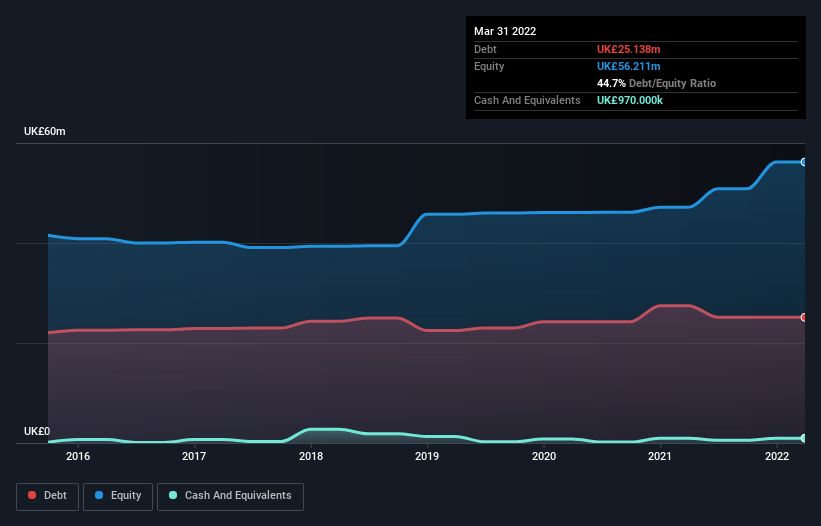- United Kingdom
- /
- Infrastructure
- /
- AIM:SUH
Here's Why Sutton Harbour Group (LON:SUH) Has A Meaningful Debt Burden

Legendary fund manager Li Lu (who Charlie Munger backed) once said, 'The biggest investment risk is not the volatility of prices, but whether you will suffer a permanent loss of capital.' It's only natural to consider a company's balance sheet when you examine how risky it is, since debt is often involved when a business collapses. Importantly, Sutton Harbour Group plc (LON:SUH) does carry debt. But is this debt a concern to shareholders?
When Is Debt Dangerous?
Debt and other liabilities become risky for a business when it cannot easily fulfill those obligations, either with free cash flow or by raising capital at an attractive price. Ultimately, if the company can't fulfill its legal obligations to repay debt, shareholders could walk away with nothing. However, a more common (but still painful) scenario is that it has to raise new equity capital at a low price, thus permanently diluting shareholders. Having said that, the most common situation is where a company manages its debt reasonably well - and to its own advantage. When we examine debt levels, we first consider both cash and debt levels, together.
View our latest analysis for Sutton Harbour Group
How Much Debt Does Sutton Harbour Group Carry?
The image below, which you can click on for greater detail, shows that Sutton Harbour Group had debt of UK£25.1m at the end of March 2022, a reduction from UK£27.5m over a year. On the flip side, it has UK£970.0k in cash leading to net debt of about UK£24.2m.

A Look At Sutton Harbour Group's Liabilities
According to the last reported balance sheet, Sutton Harbour Group had liabilities of UK£6.55m due within 12 months, and liabilities of UK£26.6m due beyond 12 months. Offsetting these obligations, it had cash of UK£970.0k as well as receivables valued at UK£617.0k due within 12 months. So it has liabilities totalling UK£31.5m more than its cash and near-term receivables, combined.
Given this deficit is actually higher than the company's market capitalization of UK£31.2m, we think shareholders really should watch Sutton Harbour Group's debt levels, like a parent watching their child ride a bike for the first time. Hypothetically, extremely heavy dilution would be required if the company were forced to pay down its liabilities by raising capital at the current share price.
In order to size up a company's debt relative to its earnings, we calculate its net debt divided by its earnings before interest, tax, depreciation, and amortization (EBITDA) and its earnings before interest and tax (EBIT) divided by its interest expense (its interest cover). The advantage of this approach is that we take into account both the absolute quantum of debt (with net debt to EBITDA) and the actual interest expenses associated with that debt (with its interest cover ratio).
Sutton Harbour Group shareholders face the double whammy of a high net debt to EBITDA ratio (15.6), and fairly weak interest coverage, since EBIT is just 1.5 times the interest expense. This means we'd consider it to have a heavy debt load. The good news is that Sutton Harbour Group grew its EBIT a smooth 95% over the last twelve months. Like the milk of human kindness that sort of growth increases resilience, making the company more capable of managing debt. When analysing debt levels, the balance sheet is the obvious place to start. But you can't view debt in total isolation; since Sutton Harbour Group will need earnings to service that debt. So if you're keen to discover more about its earnings, it might be worth checking out this graph of its long term earnings trend.
But our final consideration is also important, because a company cannot pay debt with paper profits; it needs cold hard cash. So we always check how much of that EBIT is translated into free cash flow. Over the last three years, Sutton Harbour Group saw substantial negative free cash flow, in total. While investors are no doubt expecting a reversal of that situation in due course, it clearly does mean its use of debt is more risky.
Our View
To be frank both Sutton Harbour Group's net debt to EBITDA and its track record of converting EBIT to free cash flow make us rather uncomfortable with its debt levels. But on the bright side, its EBIT growth rate is a good sign, and makes us more optimistic. It's also worth noting that Sutton Harbour Group is in the Infrastructure industry, which is often considered to be quite defensive. Overall, we think it's fair to say that Sutton Harbour Group has enough debt that there are some real risks around the balance sheet. If all goes well, that should boost returns, but on the flip side, the risk of permanent capital loss is elevated by the debt. The balance sheet is clearly the area to focus on when you are analysing debt. But ultimately, every company can contain risks that exist outside of the balance sheet. Be aware that Sutton Harbour Group is showing 2 warning signs in our investment analysis , and 1 of those is potentially serious...
If, after all that, you're more interested in a fast growing company with a rock-solid balance sheet, then check out our list of net cash growth stocks without delay.
New: Manage All Your Stock Portfolios in One Place
We've created the ultimate portfolio companion for stock investors, and it's free.
• Connect an unlimited number of Portfolios and see your total in one currency
• Be alerted to new Warning Signs or Risks via email or mobile
• Track the Fair Value of your stocks
Have feedback on this article? Concerned about the content? Get in touch with us directly. Alternatively, email editorial-team (at) simplywallst.com.
This article by Simply Wall St is general in nature. We provide commentary based on historical data and analyst forecasts only using an unbiased methodology and our articles are not intended to be financial advice. It does not constitute a recommendation to buy or sell any stock, and does not take account of your objectives, or your financial situation. We aim to bring you long-term focused analysis driven by fundamental data. Note that our analysis may not factor in the latest price-sensitive company announcements or qualitative material. Simply Wall St has no position in any stocks mentioned.
About AIM:SUH
Sutton Harbour Group
Engages in the provision of harbour and its ancillary facilities in the United Kingdom.
Fair value with imperfect balance sheet.
Market Insights
Community Narratives





